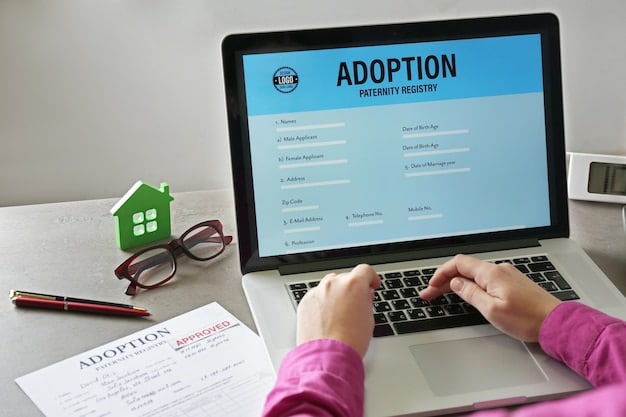Understanding Your Rights: HUD’s Fair Housing Act in 2025

Understanding HUD’s Fair Housing Act in 2025 is crucial for tenants in the US, guaranteeing equal housing opportunities regardless of race, color, national origin, religion, sex, familial status, or disability, ensuring a fair and inclusive rental market.
Are you aware of your rights as a tenant under the Fair Housing Act? As we move towards 2025, it’s more important than ever to understand how Understanding HUD’s Fair Housing Act: Your Rights as a Tenant in 2025 protects you from discrimination in housing.
What is HUD’s Fair Housing Act?
The Fair Housing Act, enacted as Title VIII of the Civil Rights Act of 1968, is a federal law that prohibits discrimination in the sale, rental, and financing of housing based on certain protected characteristics. The U.S. Department of Housing and Urban Development (HUD) is responsible for enforcing this act, ensuring that all individuals have equal access to housing opportunities.
This law is designed to create inclusive communities where everyone has a fair chance to secure housing without facing prejudice. Understanding its provisions is vital for both tenants and landlords alike.
Protected Classes Under the Fair Housing Act
The Fair Housing Act protects individuals from discrimination based on several specific characteristics. These are known as protected classes and include:
- Race
- Color
- National Origin
- Religion
- Sex (including sexual orientation and gender identity)
- Familial Status (families with children under 18)
- Disability
Landlords cannot legally refuse to rent to someone, set different terms or conditions, or provide different services based on these protected characteristics.
Prohibited Actions by Landlords
The Fair Housing Act outlines specific actions that landlords are prohibited from taking. These actions include:
- Refusing to rent or sell housing
- Setting different terms or conditions for sale or rental
- Falsely denying that housing is available
- Harassment
- Refusing to make reasonable accommodations for people with disabilities
It’s crucial for tenants to understand these prohibited actions to recognize potential violations of their rights.
In essence, the Fair Housing Act forms the bedrock of equitable housing opportunities in the United States. By safeguarding individuals from discriminatory practices, it promotes inclusivity and ensures that housing access is determined by fair and objective criteria. As tenants become well-versed in their rights and landlords uphold their obligations, the vision of a truly fair housing landscape gets closer to realization.
Key Rights for Tenants Under the Act
Tenants have several key rights under the Fair Housing Act. These rights ensure that individuals are treated fairly and have equal access to housing opportunities. Understanding these rights is crucial for protecting yourself from discrimination.
These rights include the ability to rent or purchase housing without discrimination, the right to reasonable accommodations for disabilities, and the right to file a complaint if you believe you have been discriminated against.
Right to Rent or Purchase Without Discrimination
One of the most fundamental rights under the Fair Housing Act is the right to rent or purchase housing without facing discrimination. This means that landlords and sellers cannot refuse to rent or sell to you because of your race, color, national origin, religion, sex, familial status, or disability.
It also means that they cannot set different terms or conditions for you, such as charging you a higher rent or requiring a larger security deposit, based on these protected characteristics.
Right to Reasonable Accommodations
The Fair Housing Act requires landlords to make reasonable accommodations for people with disabilities. A reasonable accommodation is a change or adjustment to a rule, policy, practice, or service that allows a person with a disability to have equal access to and enjoyment of a dwelling.
For example, if a tenant with a mobility impairment needs a parking space closer to their unit, the landlord must provide one if it is reasonable and does not cause undue hardship.
Right to File a Complaint
If you believe you have been discriminated against in violation of the Fair Housing Act, you have the right to file a complaint with HUD. HUD will investigate the complaint and determine whether there is reasonable cause to believe that discrimination occurred.
Filing a complaint is a critical step in holding landlords accountable and ensuring that fair housing laws are enforced.

In summary, the Fair Housing Act furnishes tenants with essential rights that guarantee equitable access to housing. These rights span from the fundamental assurance of renting or buying property sans discrimination to the provision of reasonable accommodations for persons with disabilities. Moreover, the Act empowers tenants to initiate complaints with HUD in situations where discriminatory practices are suspected. Armed with a comprehensive comprehension of these rights, tenants can skillfully safeguard themselves against prejudice and actively advocate for fairness within the housing sector.
How to Identify Housing Discrimination
Identifying housing discrimination can be challenging, as it often takes subtle forms. However, there are several indicators that can suggest discrimination is occurring. Being aware of these signs can empower tenants to recognize and address unfair treatment.
These indicators include being treated differently than other tenants, facing discriminatory statements or advertisements, and encountering suspicious or inconsistent responses from landlords.
Different Treatment Compared to Other Tenants
One of the most common signs of housing discrimination is being treated differently than other tenants. This could manifest in various ways, such as:
- Being charged a higher rent or security deposit
- Facing stricter rules or enforcement
- Being provided with fewer amenities or services
- Experiencing delays or denials in maintenance requests
If you notice that you are being treated differently than other tenants and you suspect it is based on your race, color, national origin, religion, sex, familial status, or disability, it may be a sign of discrimination.
Discriminatory Statements or Advertisements
Landlords are prohibited from making discriminatory statements or publishing discriminatory advertisements. These statements or ads can express a preference for or limitation on certain types of tenants.
For example, an advertisement that states “No families with children” or “Ideal for single professionals” is discriminatory and violates the Fair Housing Act.
Suspicious or Inconsistent Responses
If you notice that a landlord is providing suspicious or inconsistent responses to your inquiries or application, it could be a sign of discrimination. This might include:
- Changing the availability of a unit after meeting you
- Providing vague or evasive answers to your questions
- Suddenly increasing the rent or deposit amount
These inconsistencies can suggest that the landlord is attempting to conceal discriminatory motives.
Discrimination in housing encompasses a spectrum of subtle and manifest indications. Recognizing instances where individuals are subjected to disparities, spotting biased declarations or promotions, and remaining vigilant for untrustworthy or conflicting replies from property owners constitute essential steps in pinpointing possible discriminatory actions. Through heightening awareness and understanding, tenants become equipped to confront injustice and champion their entitlements in the pursuit of equitable housing opportunities.
Filing a Fair Housing Complaint with HUD
If you believe you have experienced housing discrimination, filing a complaint with HUD is a crucial step in seeking justice. Understanding the process and requirements for filing a complaint can help you navigate the system effectively.
The process involves gathering documentation, completing the complaint form, and submitting it to HUD within the specified time frame. HUD will then investigate your complaint and take appropriate action.
Gathering Documentation
Before filing a complaint, it is important to gather as much documentation as possible to support your claim. This documentation may include:
- Copies of rental applications
- Lease agreements
- Correspondence with the landlord (emails, letters, etc.)
- Photographs or videos
- Witness statements
The more evidence you can provide, the stronger your case will be.
Completing the Complaint Form
To file a complaint with HUD, you must complete the official complaint form. The form requires you to provide information about yourself, the landlord, and the details of the alleged discrimination.
Be sure to fill out the form completely and accurately, providing as much detail as possible about the incident(s) of discrimination.
Submitting the Complaint

Once you have completed the complaint form and gathered your documentation, you must submit it to HUD within one year of the alleged discrimination. You can submit the complaint online, by mail, or in person.
HUD will review your complaint and determine whether it warrants further investigation. If HUD decides to investigate, they will notify the landlord and begin gathering additional information.
Initiating a Fair Housing complaint to HUD serves as an invaluable avenue for individuals encountering prejudice in housing. By adhering to documented methods, meticulously completing the appropriate forms, and providing comprehensive accounts, tenants augment their prospects of achieving equitable restitution. HUD’s commitment to scrutinizing these claims ensures that landlords stay liable for any discriminatory actions, thereby reinforcing the tenets of equitable housing protocols.
HUD’s Investigation Process
Once a fair housing complaint is filed, HUD initiates an investigation to determine if discrimination occurred. This process involves several steps, including notifying the parties involved, gathering evidence, and making a determination.
Understanding HUD’s investigation process can help tenants know what to expect and how to participate effectively in the process.
Notification of the Parties Involved
After a complaint is filed, HUD will notify both the complainant (the person who filed the complaint) and the respondent (the landlord or seller who is accused of discrimination). The notification will include a copy of the complaint and information about the investigation process.
The respondent will have an opportunity to respond to the allegations and provide their own evidence.
Evidence Gathering
HUD will gather evidence from both the complainant and the respondent to determine whether discrimination occurred. This evidence may include:
- Document reviews
- Interviews with witnesses
- Site visits
- Data analysis
HUD may also request additional information from third parties, such as housing agencies or fair housing organizations.
Determination and Resolution
After gathering all the evidence, HUD will make a determination as to whether there is reasonable cause to believe that discrimination occurred. If HUD finds reasonable cause, they will attempt to resolve the complaint through conciliation.
If conciliation is unsuccessful, HUD may file a charge of discrimination and pursue legal action against the respondent.
HUD’s examination procedure entails several phases aimed at ascertaining occurrence of discrimination in housing. By diligently notifying parties implicated, compiling pertinent data, and impartially assessing the proof, HUD endeavors to ascertain whether discriminatory behaviors have arisen. Ultimately, depending on conclusions derived from the investigation, HUD aims to resolve grievances amicably or, when warranted, pursue legal avenues to rectify injustices and reinforce upholding the precepts of equitable housing practices.
The Future of Fair Housing in 2025
Looking ahead to 2025, the Fair Housing Act remains a critical tool for ensuring equal housing opportunities. However, there are ongoing challenges and emerging issues that must be addressed to continue progress towards fair housing for all.
These challenges include addressing systemic discrimination, promoting inclusive communities, and adapting to evolving housing needs and technologies.
Addressing Systemic Discrimination
Systemic discrimination, which refers to policies and practices that perpetuate inequality in housing, remains a significant challenge. Addressing this requires a multi-faceted approach that includes:
- Strengthening fair housing enforcement
- Promoting fair housing education and outreach
- Investing in affordable housing in underserved communities
By tackling systemic discrimination, we can create more equitable housing opportunities for all.
Promoting Inclusive Communities
Creating inclusive communities where people of all backgrounds can live and thrive is essential for fair housing. This includes:
- Encouraging mixed-income and mixed-race housing developments
- Supporting community organizations that promote diversity and inclusion
- Implementing policies that promote fair housing choice
Inclusive communities foster understanding, respect, and opportunity for all residents.
Adapting to Evolving Needs and Technologies
As housing needs and technologies evolve, the Fair Housing Act must adapt to remain effective. This includes:
- Addressing discrimination in online housing platforms
- Ensuring accessibility for people with disabilities in new technologies
- Promoting fair housing policies that address emerging housing trends
In anticipation of 2025, advancing the tenets of Fair Housing necessitates resolution of pervasive discrimination, cultivation of welcoming neighborhoods, and adjustment to ever-changing housing prerequisites and technologies. Through confronting intrinsic biases, fostering varied settlements, and seizing novel technical solutions, we are able to construct an equitable and just housing realm, ensuring that all individuals enjoy similar possibilities irrespective of their origin or circumstances. An unwavering dedication to upholding Fair Housing principles is vital for shaping a future society where housing constitutes a fundamental entitlement accessible to all.
| Key Point | Brief Description |
|---|---|
| 🏠 Protected Classes | Race, color, religion, sex, national origin, familial status, and disability. |
| ⚖️ Tenant Rights | Right to rent without discrimination, reasonable accommodations, and to file complaints. |
| 🕵️ Identification | Look for different treatment, biased statements, and inconsistent responses. |
| 📝 Complaint Filing | Gather documentation, complete form, submit to HUD within one year. |
Frequently Asked Questions
▼
The Fair Housing Act protects against discrimination in housing based on race, color, national origin, religion, sex, familial status, and disability. It ensures equal housing opportunities for everyone.
▼
If you experience discrimination, you can file a complaint with HUD within one year of the incident. You’ll need to provide documentation and fill out the official complaint form.
▼
Reasonable accommodations are changes or adjustments to rules, policies, or services that allow people with disabilities to have equal housing access. Examples include accessible parking or service animal accommodations.
▼
If you suspect housing discrimination, gather any evidence, such as emails or witness statements, and consider filing a complaint with HUD. Document all instances of suspected discrimination.
▼
HUD investigates complaints by notifying parties, gathering evidence, conducting interviews, and reviewing documents. They then determine if there is reasonable cause to believe discrimination occurred and pursue resolution.
Conclusion
Understanding the Fair Housing Act is essential for protecting your rights as a tenant and ensuring equal housing opportunities. By knowing your rights, recognizing discrimination, and taking action when necessary, you can help create a fairer and more inclusive housing market for everyone.





